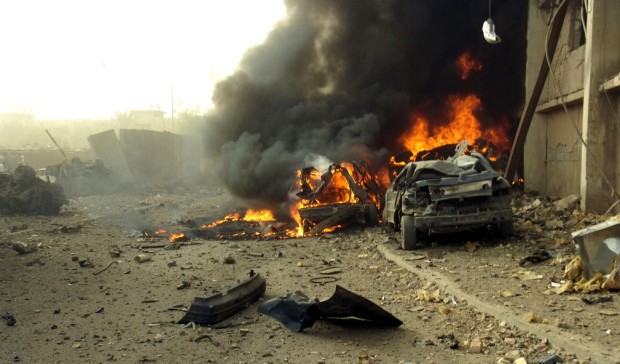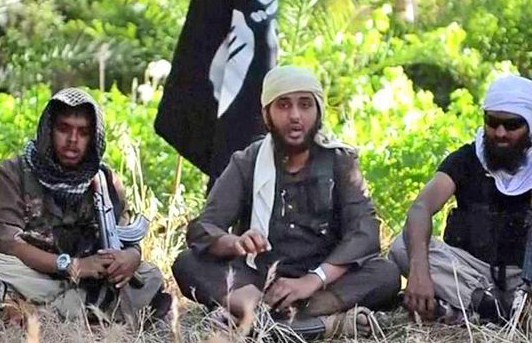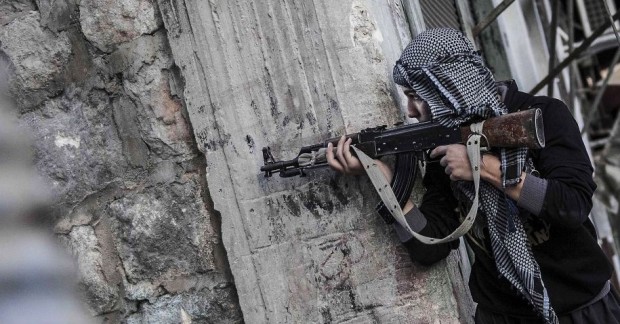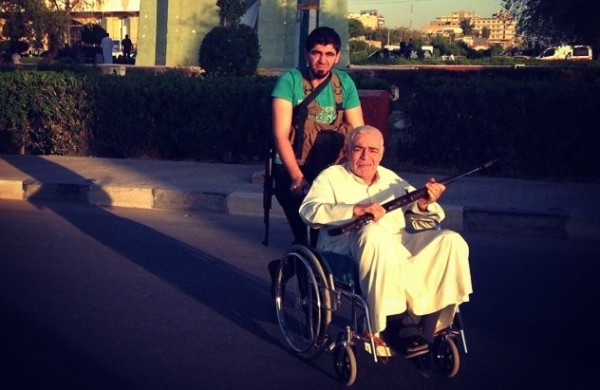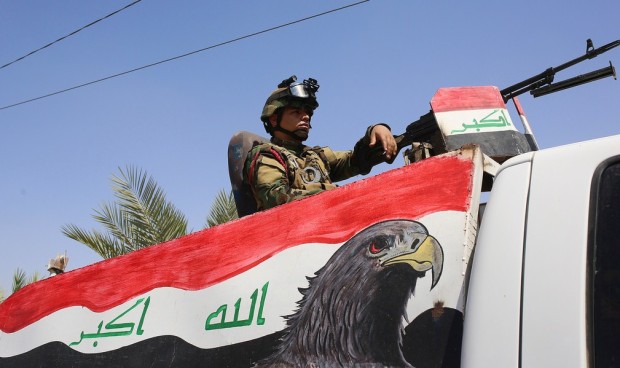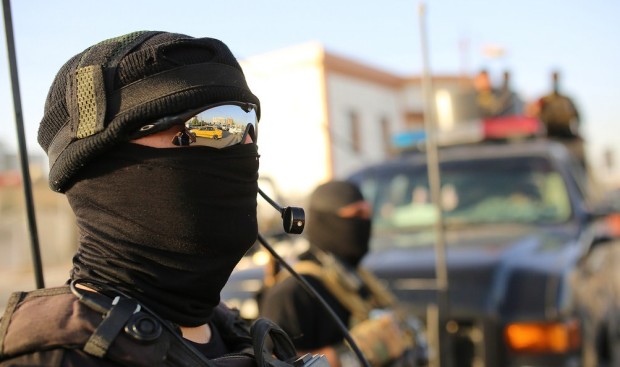The West, Saudi Arabia and Qatar are Responsible for Talibanization of Iraq
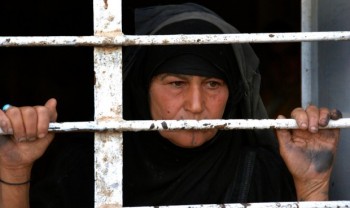
Geopolitics of chaos backfire
An all-out regional sectarian war between Sunnis and Shiites might not have been the goal, but it is certainly the result. Anyone with even a rudimentary knowledge of the region should have known that Iraq, Libya and Syria, without strongmen like Saddam Hussein, Muammar Gaddafi, and Bashar al-Assad at their helm, were likely to implode into chaos. Who might ultimately profit from fueling a fratricidal war within Islam? Could this be a strategy of ash and ruins, preliminary to the expansion of the Jewish state into the so-called Greater Israel?
In 2003, under the pretext of a war on terror, the US invaded Iraq. Eleven years later, it is the Jihadists of ISIS who can say “mission accomplished.” Iraq and Syria are in ruins, soaked with the blood of several hundred thousand people, and millions of their nationals are scattered to the wind as refugees. As this tragedy continues for Iraqis and Syrians, their former government officials are enjoying their retirements with hobbies such as painting, without facing international tribunals for war crimes, such as using depleted uranium weapons in civilian areas. They are more eager than ever to rewrite history and pass the blame to someone else. What could have gone so wrong?
Policymakers in the US and European Union, as well as their mainstream media echo chambers, act as if they have been caught off guard by the rise of ISIS. Were they sleeping at the wheel when their Machiavellian policy of playing Sunnis against Shiites, using Islamist fundamentalists soldiers of fortune, blew up into their faces. Large swaths of Iraq and Syria have been taken by a 60,000-strong Jihadist army. They are on the move, are combat hardened and now have their own funds. ISIS is estimated to possess more than $2.3 billion in assets.
When ISIS took Mosul in its three-day offensive, which also gave it control of Tikrit, it robbed all the assets of Mosul Central Bank: around $500 million plus a large amount of gold. Consequently, the Jihadists of ISIS do not have to rely on the deep pockets of Qatar and Saudi Arabia anymore and are no longer the tools of Saudis or Qataris. They have the numbers, plenty of money to make new recruits and buy weapons, and their own agenda. ISIS is stronger and more ambitious than al-Qaeda ever was. ISIS wants to redraw the map of the Middle East.
ISIS: Out of imperialism’s pandora’s box
Iraqi Prime Minister Nouri al-Maliki has rightly accused Saudi Arabia and Qatar of having sponsored the Jihadists of ISIS for about three years, ever since the start of the Syrian civil war. Al-Maliki should also blame the US and its European allies. By invading Iraq in 2003, toppling Saddam Hussein, and then fostering and sponsoring of the Jihadists in Syria since 2011, Qatar, Saudi Arabia and the US have opened a geopolitical pandora’s box. Out of it came ISIS. United States foreign policy has been schizophrenic for decades, but it recently reached the apex of contradiction: to please Saudis and Qataris, Washington has supported the Jihadist fighters against Assad in Syria, and simultaneously in Iraq, Washington has supported (sort of) al-Maliki’s government against those same Jihadists.
The outcome was predictable, and one could wish that top policymakers would be held accountable for this crime of astonishing stupidity. As early as February 2012, we were raising concerns that Syria’s civil/proxy war could easily become a full-blown regional sectarian war between Sunnis and Shiites. Again, on June 26, 2012, I commented in a Russia Today (RT) interview that the US was backing up a de facto Talibanization of the Middle East, just like the Reagan administration did in Afghanistan during the 1980s.
Welcome to Jihadistan!
The Islamist fighters thrived first in Iraq, where they seized on the opportunities presented by the toppling of Saddam Hussein, the US withdrawal, and a Shiite-dominated Iraqi government that largely failed to be inclusive of Sunnis. Then in 2011, ISIS and its many affiliates took advantage of a weakened Assad government in Syria. Flush with petro-dollars from Qatar and Saudi Arabia, they quickly became Assad’s leading military opposition. The Jihadists of ISIS are an Islamist foreign legion. They come from, not only the entire Islamic world, but also Europe. Thousands joined their ranks in Syria. The leader of ISIS is an Iraqi called al-Baghdadi. ISIS controls Syria’s southeast and all Iraq’s Sunni-majority area. The goal of ISIS is to impose a Caliphate, i.e. an Islamist state under strict sharia law to encompass much of the Arab world.
Who is afraid of ISIS?
The rise of ISIS is so concerning that it has motivated some abrupt reversal of alliances and made some strange bedfellows. On June 18, 2014, the Obama administration announced that 300 so-called military advisers would be sent to Iraq. Reading between the lines, this means that thousands of US special forces will be sent to secure the Iraqi oil fields and the Green Zone in Baghdad. The crisis has provoked a rapprochement between Washington and Teheran. Iran has sent at least 2,000 of its revolutionary guards to protect Baghdad. At least for the time being, American and Iranian special forces will be allied against ISIS.
Down the line, Iran’s military involvement could grow. The ISIS crisis will also be an opportunity for Assad’s troops, with the help of Hezbollah, to maintain their momentum. Those who should be most concerned about the Jihadists’ blitzkrieg in Iraq might be ISIS’ own biological fathers: the kings and sheiks of the Gulf States. If ISIS takes Baghdad, who can stop the Jihadist march on Doha (Qatar), Riyadh (Saudi Arabia), or even Amman (Jordan), in a most unwelcome return of the prodigal son.
Editor’s Notes: Photographs one, four, and six by James Gordon. Photographs two, seven and eleven from Freedom House. Photographs eight, nine and ten by Ahmad Mousa.
About the author
Gilbert Mercier is the Editor in Chief of News Junkie Post, where this essay originally appeared.
– See more at: http://newsjunkiepost.com/2014/06/20/rise-of-isis-west-saudi-arabia-and-qatar-are-responsible-for-talibanization-of-iraq/#sthash.mE0mxPOC.dpuf




